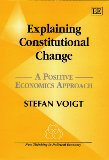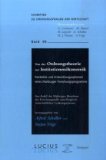Prof. Dr. rer. pol. Stefan Voigt
Professor - aktiv
Jahrgang
1962
1962
Position / Amtsbezeichnung
Institutsdirektor
Institutsdirektor
Universität
Universität Hamburg
Universität Hamburg
Fachbereich
Fakultät für Rechtswissenschaft
Fakultät für Rechtswissenschaft
Institut
Institut für Recht & Ökonomik
Institut für Recht & Ökonomik
Arbeitsbereiche
Recht & Ökonomik
Recht & Ökonomik
Land
Deutschland
Deutschland
Ort / PLZ
20148 Hamburg
20148 Hamburg
Strasse
Rothenbaumchaussee 36
Rothenbaumchaussee 36
Telefon
(040) 42838-5782
(040) 42838-5782
FAX
(040) 42838-6794
(040) 42838-6794
Auszeichnungen und Ehrungen
Prize for the best habilitation at the University of Jena in 1997 and 1998 amongst all faculties
Walter-Eucken-Prize for "outstanding contributions to the theory of order" donated by the Stifterverband der Deutschen Wissenschaft (1994)
Bücher
Veröffentlichungen
(gemeinsam mit André Schmidt), Making European Merger Policy More Predictable, Springer: Heidelberg et al., 2005.
Institutionenökonomik, Beitrag in der Neuen Ökonomischen Bibliothek, UTB (Fink Verlag), 2002 (Neuauflage 2009; tschechische Übersetzung [„Institucionální ekonomie“] 2008, chinesische Übersetzung in Vorbereitung).
Verfassungswandel ökonomisch erklären: Fragen und Einsichten eines neuen und interdisziplinären Forschungsprogramms, Colloquia Academica – Akademievorträge junger Wissenschaftler, Stuttgart, Franz Steiner Verlag, 2001.
(gemeinsam mit Thoralf Erb, Jochen Jahraus, Uwe Mummert und Axel Schulz): Konsequenzen der Globalisierung für die Wettbewerbspolitik, Frankurt et al., 2000.
Explaining Constitutional Change - A Positive Economics Approach, Cheltenham, Edward Elgar, 1999.
Die Welthandelsordnung zwischen Konflikt und Stabilität - Konfliktpotentiale und Konfliktlösungsmechanismen, Freiburg: Haufe, 1992.
Herausgeber von Sammelbänden
(gemeinsam mit Eli Salzberger); “Separation of powers: new perspectives and empirical findings”; Sondernummer von Constitutional Political Economy (vol 20, no.3-4, 2009)
(gemeinsam mit Max Albert und Dieter Schmidtchen); Scientific Competition, Conferences on New Political Economy, Vol. 25, 2008.
(gemeinsam mit Max Albert und Dieter Schmidtchen); The More Economic Approach to European Competition Law, Conferences on New Political Economy, Vol. 24, 2007
(gemeinsam mit Max Albert und Dieter Schmidtchen); International Conflict Resolution, Conferences on New Political Economy, Vol. 23, 2006.
Constitutional Political Economy, International Library of Critical Writings in Economics (2 Bände), Cheltenham: Edward Elgar, 2003.
(gemeinsam mit H.-J. Wagener:) Constitutions, Markets and the Law – Recent Experiences in Transition Economies, Cheltenham: Edward Elgar, 2002.
(gemeinsam mit Manfred E. Streit:) Europa reformieren - Vorschläge von Ökonomen und Juristen zur zukünftigen Verfaßtheit Europas, Baden-Baden: Nomos, 1996.
Aufsätze in Periodika
(58) (gemeinsam mit Anne van Aaken und Lars Feld) “ Do Independent Prosecutors Deter Political Corruption? – An Empirical Evaluation Across 78 Countries, forthcoming in: American Law and Economics Review.
(57) “The Effects of Lay Participation in Courts – A Cross Country Analysis.” European Journal of Political Economy (2009) (DOI:10.1016/j.ecpoleco.2009.02.005)
(56) (gemeinsam mit Lorenz Blume und Jens Müller) “The Economic Effects of Direct Democracy – A First Global Assessment.” Public Choice (2009)(DOI 10.1007/s11127-009-9429-8).
(55) (gemeinsam mit Lorenz Blume, Jens Müller und Carten Wolf); The Economic Effects of Constitutions: Replicating – and Extending – Persson and Tabellini, Public Choice 139:197-225 (2009).
(54) “Explaining Constitutional Garrulity”, erscheint in: International Review of Law and Economics (2009).
(53) (gemeinsam mit Lorenz Blume und Thomas Döring): „Fiskalische Effekte der Kommunalverfassungsreformen der 1990er Jahre in Deutschland”, Jahrbücher für Nationalökonomie und Statistik 228(4): 317-2008.
(52) “The Effects of Competition Policy on Development – Cross-Country Evidence Using Four New Indicators”, erscheint in: Journal of Development Studies (45(8):1-24; 2009).
(51) (gemeinsam mit Anne van Aaken) “Verhaltenspflichten für Parlamentarier und ihre Folgen“ (“Individual Disclosure Rules for Parliamentarians and their Consequences”, in: Mitteilungen des Instituts für Deutsches und Europäisches Parteienrecht und Parteienforschung (MIP) 2007, Vol. 13, available at: http://www.pruf.de. Eine modifizierte Fassung als “Der „gläserne“ Abgeordnete? Transparenzregeln für Parlamentarier und ihre Folgen, Journal für Rechtspolitik 16(3):169 - 176(2008).
(50) (gemeinsam mit Bernd Hayo) “Inflation, Central Bank Independence and the Legal System”, Journal of Institutional and Theoretical Economics, 164(4), 751—777 (2008).
(49) “The Economic Effects of Judicial Accountability – Cross-Country Evidence”, European Journal of Law & Economics 25(2):95-123 (2008).
(48) “Are International Merchants Stupid? – Their Choice of Law Sheds Doubt on the Legal Origin Theory”, Journal of Empirical Legal Studies 5(1):1-20. (2008).
(47) (gemeinsam mit Lorenz Blume): “The Economic Effects of Human Rights”, Kyklos 60(4):509-38 (2007).
(46) (gemeinsam mit Bernd Hayo): Explaining de facto Judicial Independence, International Review of Law and Economics, 27(3):269-90 (2007)
(45) (gemeinsam mit Lorenz Blume) “Wenn Justitia die Hand aufhält – Ursachen und Folgen korrupter Justizbehörden; Perspektiven der Wirtschaftspolitik, 8(1):65-92 (2007).
(44) (gemeinsam mit Lorenz Blume und Michael Ebeling): Improving Credibility by Delegating Judicial Competence – the Case of the Judicial Committee of the Privy Council, Journal of Development Economics, 82:348-73 (2007).
(43) Robust Political Economy: The Case of Antitrust, Review of Austrian Economics 19 (2/3):203-15 (June 2006).
(42) (gemeinsam mit Thomas Döring): Reforming Federalism German Style – More than a Minor Face Lift? Intereconomics: Review of European Economic Policy 41(4): 201-8 (2006).
(41) (gemeinsam mit André Schmidt): Der „more economic approach“ in der Missbrauchsaufsicht: Einige kritische Anmerkungen zu den Vorschlägen der Generaldirektion Wettbewerb, Wirtschaft und Wettbewerb November 2006:1097-1106.
(40) (gemeinsam mit André Schmidt): Die prozeduralen Aspekte der Fusionskontrolle – die vergessene Seite der Reform, Jahrbuch für Wirtschaftswissenschaften, 56(2): 164-84 (2005).
(39) Crisis – What Crisis? After the Failure of the Draft Constitution, Europe Needs Thorough Discusssions – and a New Focus on Integration, Intereconomics 40(4):196-200.
(38) (gemeinsam mit Roland Kirstein): The Violent and the Weak – When Dictators Care About Social Contracts; American Journal of Economics and Sociology, 65(4): 863-90 (2006).
(37) Islam and the Institutions of a Free Society, The Independent Review, 10(1): 59-82, 2005.
(36) The Consequences of Popular Participation in Constitutional Choice – Towards A Comparative Analysis, erscheint in: Rechtstheorie, 2005.
(35) (gemeinsam mit André Schmidt): “The Commission’s Guidelines on Horizontal Mergers: Improvement or Deterioration?” Common Market Law Review, 2004 (41(6):1583-94).
(34) (gemeinsam mit André Schmidt): “Switching to Substantial Impediments of Competition (SIC) can have Substantial Costs – SIC!”, European Competition Law Review, 2004. (25(9):584-89)
(33) (gemeinsam mit Anne van Aaken und Eli Salzberger): The Prosecution of Public Figures and the Separation of Powers: Confusion within the Executive Branch – A Conceptual Framework, Constitutional Political Economy 15(3):261-80; 2004.
(32) Iudex Calculat: The ECJ’s Quest for Power, Jahrbuch für Neue Politische Ökonomie, 22:77-101 (2003).
(31) Towards Ever More Confusion? The Convention’s Proposal for a European Constitution, Intereconomics 38(4):185-8 (2003).
(30) (gemeinsam mit André Schmidt): Mehr Rechtssicherheit in der Europäischen Fusionskontrolle?, Wirtschaft und Wettbewerb 53(9): 897-906 (2003).
(29) (gemeinsam mit Lars Feld): Economic Growth and Judicial Independence: Cross Country Evidence Using a New Set of Indicators, European Journal of Political Economy 19(3):497-527 (2003).
(28) Die unabhängige Justiz – eine vernachlässigte Determinante zur Erklärung der Zentralbankunabhängigkeit?; Schmollers Jahrbuch 122(2):207-25, 2002.
(27) (gemeinsam mit Eli Salzberger): Choosing Not to Choose: When Politicians Choose to Delegate Powers, Kyklos 55(2):247-68; 2002.
(26) (gemeinsam mit Eli Salzberger): On the Delegation of Powers – with Special Emphasis on Central and Eastern Europe and Israel, Theoretical Inquiries in Law 3(1):207-63; 2002.
(25) (gemeinsam mit Eli Salzberger): On the Delegation of Powers – with Special Emphasis on Central and Eastern Europe, Constitutional Political Economy 13(1):25-52; 2002.
Eine gekürzte deutsche Fassung in: Nutzinger, H.G. (Hrsg.):
Verteilungsprobleme im Transformationsprozeß, Duncker & Humblot,
2001:9-42.
Eine leicht veränderte Fassung in: Mudambi, R., P. Navarra, and G. Sobbrio (ed.): Economic Welfare, International Business and Global Institutional Change, Cheltenham et al.: E. Elgar 2003:345-68
(24) (gemeinsam mit Gert G. Wagner): Zur Reform der Altersvorsorge – ein konstitutionenökonomischer Vorschlag, Zeitschrift für Wirtschaftspolitik 49 (2000), 235-49.
(23) „Fusionen und Globalisierung – Einige Notizen zur Genese von Wettbewerbsregeln“, Zeitschrift für Wirtschaftspolitik 49(2) (2000): 158-68.
(22) “Freiwilligkeit durch Zwangsandrohung – eine institutionenökonomische Analyse von Selbstverpflichtungserklärungen in der Umweltpolitik“; in: Zeitschrift für Umweltpolitik und Umweltrecht, Heft 3/2000, 393-407.
(21) \"Breaking with the Notion of Social Contract: Constitutions as Based on Spontaneously Arisen Institutions\", Constitutional Political Economy, 10(3), 283-300 (1999).
(20) \"Implicit Constitutional Change - Changing the Meaning of the Constitution Without Changing the Text of the Document\", European Journal of Law and Economics, 7(3) (1999), 197-224.
(19) \"Making Constitutions Work - Conditions for Maintaining the Rule of Law\", Cato Journal, 18(2) (1998), 191-208.
(18) \"Methodische Konzepte zur Reform sozialer Sicherungssysteme – einige Überlegungen aus konstitutionenökonomischer Sicht\", Zeitschrift für internationales und ausländisches Sozialrecht, 12 (1998):53-66.
(17) (gemeinsam mit Daniel Kiwit): \"Grenzen des institutionellen Wettbewerbs\", Jahrbuch für Neue Politische Ökonomie, 17 (1998): 313-37.
(16) (gemeinsam mit M.E. Streit): \"Toward Ever Closer Union - Or Ever Larger? Or Both? Entry to the European Union from the Perspective of Constitutional Economics\", eine gekürzte Fassung in International Review of Law and Economics, 16 (1996):385-8. Langfassung in Dieter Schmidtchen und Robert Cooter (Hrsg.): Constitutional Law and Economics of the European Union, Cheltenham: Elgar, 1997, 223-47.
(15) \"Positive Constitutional Economics - A Survey\", Public Choice, 90: 11-53 wiederabgedruckt in: Charles K. Rowley (Hrsg.): Constitutional Political Economy in a Public Choice Perspective, Dordrecht et al.: Kluwer, 1997, 11-53.
(14) \"Pure Eclecticism - The Tool Kit of the Constitutional Economist\", Constitutional Political Economy, 7 (1996): 177-96.
(13) \"Kompensationgeschäfte - zurück zum Naturaltausch?\", wisu 25 (1996):34- 36.
(12) (gemeinsam mit Daniel Kiwit:) \"Überlegungen zum institutionellen Wandel unter Berücksichtigung des Verhältnisses interner und externer Institutionen\", ORDO, 46 (1995):117-48.
(11) \"Die kontraktorientierte Theorie der Verfassung - Anmerkungen zum Ansatz Buchanans\", Homo Oeconomicus, XI (1994):173-209.
(10) \"European Political Union - An Appropriate Example for Applying Constitutional Economics to Real-Life Problems? - A Note on an Article by James M. Buchanan\", ORDO, 45 (1994):273-86.
(9) \"Values, Norms, Institutions, and the Prospects for Economic Growth in Central and Eastern Europe\", Journal des Economistes et des Etudes Humaines, 4 (1993):495-529. Wiederabgedruckt in: Svetozar Pejovich (Hrsg.): The Economics of Property Rights II; The International Library of Critical Writings in Economics, Cheltenham: Elgar (2001), 303-37. In tschechischer Übersetzung als: \"Hodnoty a perspectivy hospodárského rustu ve strední a východní Evrope\", Politická Ekonomie, 94 (1994):733-746. auch erschienen in: E. Jahn und R. Wildenmann (Hrsg.): Stability in East Central Europe?, Baden-Baden: Nomos, 1995, 175-207.
(8) \"Strategische Allianzen - Modisches Schlagwort oder Antwort auf globale Herausforderungen?\" WiSt, 22 (1993):246-249.
(7) \"Die Non Dilemma-These\", WiSt, 21 (1992):516- 519.
(6) \"Das Lizenzauktionsverfahren: Ein zielkonformes Instrument zur Regulierung lokaler Kabelfernsehstationen? - Eine Analyse der angloamerikanischen Diskussion und Praxis\", communications - The European Journal of Communication, 17 (1992):67-90.
(5) \"GATT - Institution der Welthandelsordnung\", WiSt, 21 (1992):32-34.
(4) (gemeinsam mit M.E. Streit:) \"Die Handelspolitik der Europäischen Gemeinschaft aus weltwirtschaftlicher Perspektive\", Hamburger Jahrbuch für Wirtschaftspolitik, 36 (1991):193-219; zugleich in: R. Wildenmann (Hrsg.); Staatswerdung Europas? – Optionen für eine Europäische Union, Baden-Baden: Nomos, 1991, 167-98; wiederabgedruckt in: Manfred E. Streit: Freiburger Beiträge zur Ordnungsökonomik, Mohr (Siebeck): Tübingen, 1995, 267-96.
(3) \"Traded Services in the GATT - What\'s all the Fuss About?\", Intereconomics, 26 (1991):177-186.
(2) \"Die evolutionsorientierte Theorie der Verfassung - Bemerkungen zum Ansatz von Hayeks\", Zeitschrift für Wirtschaftspolitik, 40 (1991):93-107; wiederabgedruckt in englischer Übersetzung als: \"On the Internal Consistency of Hayek\'s Evolutionary oriented Constitutional Economics - Some General Remarks\", Journal des Economistes et des Etudes Humaines, 3 (1993):461-476.
(1) \"Defects of the Trade Policy Review Mechanism\", Intereconomics, 25 (1990):147-8.
Aufsätze in Sammelbänden und Lexika:
(36) „Bargaining for Constitutional Change – Towards an Economic Theory of Constitutional Change“, in: M. Cano de Valle et al. (Hrsg.): Teoría de Juegos y Derecho Contemporáneo, Mexico-Stadt: Editorial Porrúa, 57-83.
(35) “Die Situation der EU-Verfassung ist verfahren – Ausweg durch Verfahren?”, in: M.T. Vogt et al. (Hrsg.): Bedingungen europäischer Solidarität, Frankfurt am Main: Peter Lang, 121-130 (2009).
(34) „Constitutional Political Economy – Analyzing the most basic layer of formal institutions”, in: Brousseau, E. and J.-M. Glachant (Hrsg.): Guidebook to the New Institutional Economics, Cambridge: CUP, chapter 17 (2008).
(33) Thirty Years on: Tullock, The Vote Motive, and Public Choice, in: Kurrild- Klitgaard (Hrsg.): The Vote Motive, Institute of Economic Affairs, London, 2006.
(32) „Economic Analysis of Constitutions“ in: David S. Clark (ed.): Encyclopedia of Law and Society, 2007.
(31) (together with Lars Feld) “Making Judges Independent – Some Proposals Regarding the Judiciary, in: R. Congleton and B. Swedenborg (eds.): Democratic Constitutional Design and Public Policy - Analysis and Evidence, Cambridge: MIT Press, 2006: 251-88.
(30) “Judicial Independence as a Necessary Component of the Rule of Law – Preliminary Insights and Economic Consequences”, in: A. Marciano and J.- M. Josselin (eds.): Law and the State. A Political Economy Approach, Cheltenham et al.: Elgar, 2005: 242-68.
(29) „On the Coexistence of Different Property Rights Systems – and Their Consequences for Economic Growth and Development”, in: E. Colombatto (ed.): Edward Elgar Companion on Property Rights; Cheltenham: Edward Elgar, 2004, 154-76.
(28) „Do We Need a New International Financial Architecture? Many Questions and Some Preliminary Policy Advice“, in: Marauhn, Th. und R. Grote (Hrsg.): On the Regulation of International Financial Markets in the Age of Liberalisation and Free Movement of Capital, Cambridge: Cambridge University Press, 2005.
(27) “Neue Institutionenökonomik als kulturelle Ökonomik” in: G. Blümle, N. Goldschmidt, R. Klump, B. Schauenberg, H.v. Senger (Hrsg.): Perspektiven einer kulturellen Ökonomik, Lit-Verlag Münster, 411-26 (2004).
(26) Versprechen glaubhaft machen – 2 neue Indikatoren zur Messung von Justizunabhängigkeit, in: Th. Eger (Hrsg.): Institutionen und wirtschaftliche Entwicklung, Berlin: Duncker & Humblot, 59-84 (2003).
(25) The Consequences of Popular Participation in Constitutional Choice – Towards A Comparative Analysis, in: Aaken, A.v., Chr. List and Chr. Lütge (eds.): Deliberation and Decision: Economics, Constitutional Theory, and Deliberative Democracy, Aldeshot: Ashgate; 2003.
(24) “The Bonds of Democratic Politics – An Economic Perspective” in: Albert Breton, Gianluigi Galeotti, Pierre Salmon, and Ronald Wintrobe (eds.): Rational Foundations of Democratic Politics, Cambridge: CUP, 147-73 (2003). Eine leicht veränderte Fassung erschienen in: Wolf Lepenies (ed.): Entangled Histories and Negotiated Universals – Centers and Peripheries in a Changing World, Frankfurt: Campus, 57-84 (2003).
(23) Stichworte „Positive Constitutional Political Economy“ and „Dictators and Social Contracts“ in: Rowley, Ch. and Schneider, F. (Hrsg.): Encyclopedia of Public Choice, Kluwer 2003.
(22) Stichwort „Constitutional Law“, erscheint in: Hatzis, A. (Hrsg.): Economic Analysis of Law: A European Perspective, Cheltenham: Edward Elgar 2004.
(21) (gemeinsam mit Hella Engerer:) „Institutionen und Transformation – Mögliche Politikimplikationen der Neuen Institutionenökonomik“, in: K. Zimmermann (Hrsg.): Neue Entwicklungen in der Wirtschaftswissenschaft, Heidelberg et al.: Physica, 2001, S. 149-215. Eine englische Fassung mit der Überschrift „Institutions and Transformation – Possible Policy Implications of the New Institutional Economics“, K. Zimmermann (ed.); Frontiers in Economics, Berlin et al.: Springer, pp. 127- 84. Chinesische Übersetzung 2005.
(20) „Konstitutionellen Wandel erklären – zur Rolle der Zivilgesellschaft als Determinante der Verfassungswirklichkeit“, erscheint in: J. Nautz (Hrsg.); Das Rechtssystem zwischen Staat und Zivilgesellschaft - Zur Rolle gesellschaftlicher Selbstregulierung und vorstaatlicher Schlichtung, Passagen Verlag, Wien 2001, 67-79. Eine leicht veränderte bulgarische Übersetzung in: Ivan Krastev (Hrsg.), Footnotes – Social Sciences and the 21st century, Sofia (2001):181-204.
(19) „Das Konzept der nationalstaatlichen Souveränität und die Theorie der Wirtschaftspolitik“ in: H. Berg (Hrsg.); Theorie der Wirtschaftspolitik: Erfahrungen – Probleme - Perspektiven, Schriften des Vereins für Socialpolitik, Band 278, Berlin: Duncker & Humblot, S. 55-78, 2001.
(18) „What Constitution for Europe? The Constitutional Question from the Point of View of (Positive) Constitutional Economics, in: Th. Bruha (Hrsg.): What Constitution for Europe? Baden-Baden: Nomos, 2002, 41-61.
(17) “Das Verhältnis von Staat und Gesellschaft bei Friedrich A. von Hayek – ein Vorschlag zur Weiterentwicklung“, in: H. Leipold und I. Pies (Hrsg.): Zur Konzeption von Ordnungstheorie und Ordnungspolitik: Bestandsaufnahme und Entwicklungsperspektiven, Stuttgart: Lucius und Lucius, 2000, 125-44.
(16) Stichwort „Ordnungsökonomik“ in Gabler Wirtschaftslexikon (15. Auflage), Wiesbaden 2000.
(15) Stichwort „Wirtschaftsforschung“ in Evangelisches Soziallexikon, Stuttgart 2000.
(14) \"Marktwirtschaftlicher Wettbewerb als Entdeckungsverfahren\", in: G. Papke (Hrsg.): Wissen, Freiheit und Ordnung - Friedrich August von Hayek, Köln: Verlag Wissenschaft und Politik, erscheint 2000 (Übersetzungen ins Chinesische sowie Englische in Vorbereitung).
(13) Stichwort \"Constitutional Law\" in Boudewijn Bouckaert und Gerrit de Geest (Hrsg.): Encyclopedia of Law & Economics, Cheltenham: Elgar, 2000, 529-42.
(12) \"Wirtschaftliche Freiheitsrechte, Ressourcenverteilung und Wirtschaftswachstum: Zum heuristischen Potential des Vergleichs von Wirtschaftssystemen\", in: Dieter Cassel (Hrsg.): Perspektiven der Systemforschung, Berlin: Duncker & Humblot, 1999, 271-97.
(11) Stichwort \"Transformation in Osteuropa\", erscheint in: Herrmann-Pillath, C. und M. Lehmann-Waffenschmidt (Hrsg.): Handbuch Evolutorische Ökonomik, Band 2: Evolutorische Ökonomik in der Anwendung, Berlin et al.: Springer, 1999.
(10) (gemeinsam mit Daniel Kiwit): \"The Role and Evolution of Beliefs, Habits, Moral Norms, and Institutions\", in: Herbert Giersch (Hrsg.): Merits and Limits of Markets, Berlin et al.: Springer, 1998, 83-108
(9) \"Das Forschungsprogramm der Positiven Konstitutionenökonomik\" in: Gerd Grözinger und Stephan Panther (Hrsg.): Unsere Konstitution in Form und guter Verfassung? Marburg: Metropolis; 1998, 279-319
(8) \"Kants Gerechtigkeitskriterien, die Wirtschaftstheorie und die ökonomischen Transformationsprozesse in Mittel- und Osteuropa\", in: Dicke, K. und K.-M. Kodalle (Hrsg.): Republik und Weltbürgerrecht, Weimar/Köln: Böhlau, 1998, 399-434
(7) Stichwort \"Spontane Ordnung\" in: Gabler Volkswirtschaftslexikon, Band 2, Wiesbaden: Gabler 1996, 998-1000. in leicht gekürzter Fassung wiederabgedruckt in: Gabler Wirtschaftslexikon, Band 4, Wiesbaden: Gabler 1996 (14. Auflage), 3524f..
(6) Stichwort \"Konstitutionenökonomik\" in: Gabler Volkswirtschaftslexikon, Band 1, Wiesbaden: Gabler 1996, 621-9. in leicht gekürzter Fassung wiederabgedruckt in: Gabler Wirtschaftslexikon, Band 2, Wiesbaden: Gabler 1996 (14. Auflage), 2213-18.
(5) \"Die konstitutionelle Ökonomik als Herausforderung für die Theorie der Wirtschaftspolitik - zugleich eine Skizze zur Weiterentwicklung einer ökonomischen Theorie der Verfassung\", in: Ingo Pies und Martin Leschke (Hrsg.): James Buchanans konstitutionelle Ökonomik, Tübingen: J.C.B Mohr (Siebeck), 1996, 157-83.
(4) \"Der Weg zur Freiheit - Mögliche Implikationen Hayekscher Hypothesen für die Transformation der Wirtschaftssysteme Mittel- und Osteuropas\", in: Hölscher, J.; A. Jacobsen, H. Tomann, H. Weisfeld (Hrsg.): Bedingungen ökonomischer Entwicklung in Zentralosteuropa, Vol.2: Wirtschaftliche Entwicklung und Systemwandel, Marburg: Metropolis, 1994,63-105.
(3) (gemeinsam mit M.E. Streit:) \"The Economics of Conflict Resolution in International Trade\", in: Friedmann, D. und E.J. Mestmäcker (Hrsg.); Conflict Resolution in International Trade, Baden-Baden: Nomos, 1993, 39- 77; wiederabgedruckt in deutscher Übersetzung als \"Die Ökonomik der Konfliktlösung im internationalen Handel\" in Manfred E. Streit: Freiburger Beiträge zur Ordnungsökonomik, Mohr (Siebeck): Tübingen, 1995, 225-63.
(2) \"Wirtschaftspolitischer Handlungsbedarf auf internationaler Ebene als Reaktion auf strategische Allianzen\", in: Prosi, G. und Ch. Watrin (Hrsg.); Dynamik des Weltmarktes - Schlankheitskur für den Staat? Veröffentlichungen der Hanns Martin Schleyer-Stiftung, Band 37, Köln: Bachem, 1993, 141-7.
(1) \"Strategische Allianzen - ein Kartell der Konzerne gegen die Konsumenten dieser Welt? Zur Frage, ob grenzüberschreitende Unternehmenskooperationen wettbewerbspolitischen Handlungsbedarf auslösen\", in: Hanns Martin Schleyer Stiftung (Hrsg.); Dynamik des Weltmarktes - Schlankheitskur für den Staat? - Forschungsergebnisse im Überblick, Köln, (1992) 226-227.
Diskussionspapiere /Beiträge im Referee-Prozeß
(11) (gemeinsam mit Bernd Hayo) “Determinants of Constitutional Change: When and Why do Countries Change their Form of Government? (zum Vortrag bei EALE Sep. 2009 akzeptiert; eingereicht beim Journal of Comparative Economics)
(10) “How (Not) to Measure Institutions”, Eingeladener Vortrag beim World Bank Workshop zur “Effectiveness of Governance”, May 2008 (eingereicht bei Kyklos).
(9) (gemeinsam mit Lorenz Blume) “The Economic Effects of Federalism – A Cross-Country Assessment”, available at: http://papers.ssrn.com/sol3/papers.cfm?abstract_id=1307169.
(8) (gemeinsam mit Lorenz Blume) “Federalism and Decentralization – A Critical Survey of Frequently Used Indicators”, available at: http://papers.ssrn.com/sol3/papers.cfm?abstract_id=1263995 (eingereich beim Canadian Journal of Economics).
(7) “Does ADR Blossom when State Courts are Bad? March 2008 (eingereicht beim Journal of Development Economics).
(6) (gemeinsam mit Axel Dreher) “Does Membership in International Organizations Increase Governments’ Credibility? Testing the Effects of Delegating Powers”, CESifo Working Paper, March 2008 (presented at annual meeting of European Public Choice Society) (eingereicht beim Journal of Law, Economics & Organization).
(5) (together with Anne van Aaken); Do Individual Disclosure Rules for Parliamentarians Improve Political Outcomes?; präsentiert bei EALE Copenhagen September 2007 (eingereicht bei Economics & Politics).
(4) (gemeinsam mit Bernd Hayo); The Relevance of Judicial Procedure for Economic Growth, CESifo Working Paper 2514, available at: http://papers.ssrn.com/sol3/papers.cfm?abstract_id=1318292 (revise and resubmit beim Journal of Law & Economics).
(3) (gemeinsam mit Lars Feld). “Unbundling Judicial Independence”, mimeo: Universities of Heidelberg and Marburg, März 2007.
(2) (gemeinsam mit Lorenz Blume) “Supreme Audit Institutions: Supremely Superfluous? A Cross Country Assessment”, März 2007 (“revise and resubmit” beim European Journal of Political Economy).
(1) “The Interplay Between National and International Law – Its Economic Effects Drawing on Four New Indicators”, Dezember 2005 (revise and resubmit bei der International Review of Law & Economics).
Miszellen
(25) “When are judges likely to be corrupt?” in: Transparency International – Global Corruption Report 2007, Cambridge: CUP.
(24) “Economic Growth, certainty in the law and judicial independence”, in: Transparency International – Global Corruption Report 2007, Cambridge: CUP.
(23) (gemeinsam mit Lorenz Blume): Case Study on Germany within the OECDProject on Multilevel Governance and the Decentralization of Public Policy, Paris 2006.
(22) Module „Neue Institutionenökonomik“ und „Economic Effects of Judicial Systems“ für Humboldt-Viadrina School of Governance, Berlin und Frankfurt (Oder), 2006.
(21) Comment on „Judicial Reforms in Developing Countries” by M. Stephenson and “Transforming Judicial Systems” by J. and Ch. Gray, in: Pleskovic, B. (Hrsg.): Annual Bank Conference on Development Economics, Washington: The World Bank, 2007, 367-373.
(20) Korreferat zu Massimo Bordignon „Aspects of EU Organization” erscheint in: Berger/Moutos (Hrsg.):Designing the New European Union, Cambridge: MIT Press 2007.
(20) Korreferat zu “Besonderheiten der Sozialwirtschaft – Grenzen des Wettbewerbs?“ erscheint in: Aufderheide, D. und Ch. Dabrowski (Hrsg.): Markt und Wettbewerb in der Sozialwirtschaft, Berlin: Duncker & Humblot, 2007.
(19) Was, wenn trotz Revision nur ein déjà vu bleibt? Kommentar zum Beitrag von Carsten Herrmann-Pillath, in: Th. Eger (Hrsg.): Voraussetzungen für grundlegende institutionelle Reformen, Berlin: Duncker & Humblot 189-91, 2006.
(18) (together with Lars Feld): How Does Judicial Independence Affect the Investment Climate? In: Kochendörfer-Lucius and B. Pleskovic (eds.): Investment Climate, Growth, and Poverty, Washington: The World Bank; pp. 53-61 (2005).
(17) Rezension von “Market-Augmenting Government – The Institutional Foundations for Prosperity”, hrsg. Von Omar Azfar & Charles A. Cadwell, Ann Arbor, MI: The University of Michigan Press, The Journal of Economic Literature, XLII(4):1138f. (2004).
(16) Rezension von Patricia Dillon and Frank C. Wykoff (2002); Creating Capitalism – Transitions and Growth in Post-Soviet Europe, Cheltenham et al.: Edward Elgar, in: The Economic Journal, Elektronische Ausgabe 2003.
(15) Der Vorhang zu und alle Fragen offen? – Einige Fragen zu Regelbindung und Unabhängigkeit in der Wirtschaftspolitik; Korreferat zu Andreas Freytag: Die ordnende Potenz des Staates: Prinzipien für eine Wettbewerbsund Währungsordnung, in: Pies, I. und Leschke, M. (Hrsg.): Walter Euckens Ordungspolitik, Tübingen: Mohr/Siebeck, 2002.
(14) The Interdependence Between Private and Constitutional Law: a Comment on the Grady & McGuire Paper, Journal of Bioeconomics 1(3):263-68.
(13) Korreferat zu Jörn Sideras (“Systems Competition needs rules – But what exactly should they look like?”) Jahrbuch für Neue Politische Ökonomie 19 (2000):188-90.
(12) Korreferat zu Ekatarina Zhuravskaya (\"Incentives to Provide Local Public Goods: Fiscal Federalism, Russian Style\") in : J.-J. Dethier (Hrsg.): Governance and Development in China, India and Russia, Dordrecht et al.: Kluwer, 2000: 171-6.
(11) Rezension von Avner Ben-Ner und Louis Putterman (Hrsg.): Economics, Values, and Organization, Cambridge University Press 1998, Weltwirtschaftliches Archiv 135(1999):358-60.
(10) Rezension von James M. Buchanan, Post-Socialist Political Economy - Selected Essays, Edward Elgar 1997, Constitutional Political Economy 10 (1) (1999): 111-13.
(9) Rezension von Branko Milanovíc; Income, inequality, and poverty during the transition from planned to market economy, The World Bank 1998, European Journal of Political Economy 14(1998):801-2.
(8) Korreferat zu Ulrich Druwe (\"Die Umsetzung ordnungsethischer Erkenntnisse in der Politik\"): \"Optimismus allein genügt nicht – die Umsetzung ordnungstheoretischer Erkenntnisse setzt deren Existenz voraus\", in: Aufderheide, D. und M. Dabrowski (Hrsg.); Wirtschaftsethik und Moralökonomik - Normen, soziale Ordnung und der Beitrag der Ökonomik, Berlin: Duncker & Humblot, 1997, 311-15.
(7) Rezension von Avinash K. Dixit; The Making of Economic Policy: A Transaction-Cost Politics Perspective, The MIT Press 1996 (Munich Lectures in Economics; Center for Economic Studies), European Journal of Political Economy, 13:389-92.
(6) Korreferat zu Keith Cowling und Roger Sugden (\"Beyond Capitalism and State Socialism\"), in: Hölscher, J.; A. Jacobsen, H. Tomann, H. Weisfeld (Hrsg.): Bedingungen ökonomischer Entwicklung in Zentralosteuropa, Vol.5: Marburg: Metropolis, 1996, 173-178.
(5) Rezension von: Blommestein, Hendrikus J. and Bernard Steunenberg (Hrsg.): Government and Markets - Establishing a Democratic Constitutional Order and a Market Economy in Former Socialist Countries, Dordrecht et al.: Kluwer Academic Publishers 1994, European Journal of Political Economy, 12 (1996): 165-8.
(4) Besprechung von Lothar Elsner; Wirtschaftliche Ungerechtigkeit als Anfrage an Markttheorie und methodistische Wirtschaftsethik, Theologie für die Praxis, 21 (1995):47-50.
(3) Besprechung von Ingo Pies; Normative Institutionenökonomik, Journal of Institutional and Theoretical Economics,151 (1994):412-415; wiederabgedruckt in spanischer Übersetzung in Dialogo Cientifico, 5 (1996):83-6.
(2) Rezension von Adam Przeworski; Democracy and the market, Constitutional Political Economy, 4 (1993):295-298.
(1) Rezension von Dieter Helm (Hsrg.); The Economic Borders of the State, Jahrbücher für Nationalökonomie und Statistik, 209 (1992):562-564. Nutzungshinweise: Jede natürliche Person darf sich nur mit einer E-Mail Adresse bei WiWi-Online registrieren lassen. Die Nutzung der Daten die WiWi-Online bereitstellt ist nur für den privaten Gebrauch bestimmt - eine gewerbliche Nutzung ist verboten. Eine automatisierte Nutzung von WiWi-Online und dessen Inhalte, z.B. durch Offline-Browser, Download-Manager oder Webseiten etc. ist ausdrücklich strengstens untersagt. Zuwiderhandlungen werden straf- und zivilrechtlich verfolgt.











